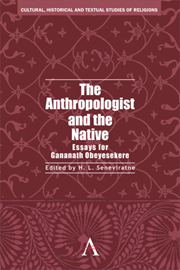Book contents
- Frontmatter
- Contents
- Editor's Note
- The Anthropologist and the Native: Essays for Gananath Obeyesekere
- SECTION I THE INDIAN TRADITION AND ITS REPRESENTATION
- SECTION II CASTE, KINSHIP, LAND AND COMMUNITY
- SECTION III RENUNCIATION AND POWER
- SECTION IV BUDDHISM TRANSFORMED
- ‘Buddhist Revival’ and the ‘Work of Culture’ in Sri Lanka, Past and Present
- Dharmapala's Buddhisms
- Religion and Globalization from the Historical Pespective of Thai Buddhism
- SECTION V THE ENIGMA OF THE TEXT
- SECTION VI THE ANTHROPOLOGIST AND THE NATIVE
- List of Contributors
‘Buddhist Revival’ and the ‘Work of Culture’ in Sri Lanka, Past and Present
from SECTION IV - BUDDHISM TRANSFORMED
Published online by Cambridge University Press: 05 May 2012
- Frontmatter
- Contents
- Editor's Note
- The Anthropologist and the Native: Essays for Gananath Obeyesekere
- SECTION I THE INDIAN TRADITION AND ITS REPRESENTATION
- SECTION II CASTE, KINSHIP, LAND AND COMMUNITY
- SECTION III RENUNCIATION AND POWER
- SECTION IV BUDDHISM TRANSFORMED
- ‘Buddhist Revival’ and the ‘Work of Culture’ in Sri Lanka, Past and Present
- Dharmapala's Buddhisms
- Religion and Globalization from the Historical Pespective of Thai Buddhism
- SECTION V THE ENIGMA OF THE TEXT
- SECTION VI THE ANTHROPOLOGIST AND THE NATIVE
- List of Contributors
Summary
Introduction
A rather undifferentiated account of late 19th and early 20th century Buddhist intellectual responses to British colonial rule and Christian presence on the island continues to inform scholarly and popular discourse on the history of Buddhism in Laṅkā, despite occasional efforts to push for refinement. Two descriptive-cum-analytical terms dominate representations of Buddhist intellectual activity at this time —‘Protestant Buddhism’ and ‘Buddhist Revival’— while a single individual—the Anagārika Dharmapāla—stands at the center of vision. The limited nature of our understanding of the intellectual culture characteristic of late 19th century and early 20th century Lankan Buddhists may be frustrating to some of us who seek a fuller historical understanding of the vitality and experimentation characteristic of that period. Further work in these areas is desirable even for narrowly scholarly historical reasons. In this essay, however, I wish to emphasize the contemporary political importance of expanding our understanding of late 19th century and early 20th century Buddhist intellectual culture. That is, this essay is a self-consciously ‘engaged’ reflection on the contemporary political dangers posed by our present account of late 19th and early 20th century Buddhist intellectual activity. I take inspiration from Gananath Obeyesekere's A Meditation on Conscience (1988), as well as his willingness to explore the connections between themes found in his own academic work and contemporary conditions on the island (1992, xix-xxi). In doing so, I draw upon two persistent lines of reflection in Obeyesekere's work which, in my view, point the way towards a more robust, and less dangerous, account of Buddhist intellectual activity during the late 19th and early 20th centuries.
- Type
- Chapter
- Information
- The Anthropologist and the NativeEssays for Gananath Obeyesekere, pp. 221 - 246Publisher: Anthem PressPrint publication year: 2011



